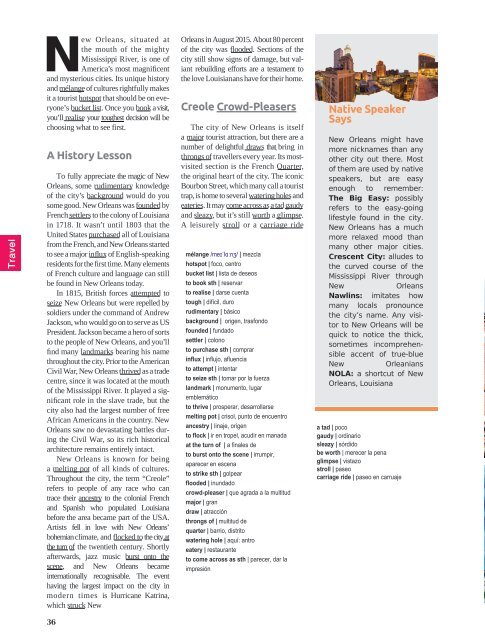EM 4 - 2018 (ESPAÑOL - digitalizado)
Create successful ePaper yourself
Turn your PDF publications into a flip-book with our unique Google optimized e-Paper software.
Travel<br />
New Orleans, situated at<br />
the mouth of the mighty<br />
Mississippi River, is one of<br />
America’s most magnificent<br />
and mysterious cities. Its unique history<br />
and mélange of cultures rightfully makes<br />
it a tourist hotspot that should be on everyone’s<br />
bucket list. Once you book a visit,<br />
you’ll realise your toughest decision will be<br />
choosing what to see first.<br />
A History Lesson<br />
To fully appreciate the magic of New<br />
Orleans, some rudimentary knowledge<br />
of the city’s background would do you<br />
some good. New Orleans was founded by<br />
French settlers to the colony of Louisiana<br />
in 1718. It wasn’t until 1803 that the<br />
United States purchased all of Louisiana<br />
from the French, and New Orleans started<br />
to see a major influx of English-speaking<br />
residents for the first time. Many elements<br />
of French culture and language can still<br />
be found in New Orleans today.<br />
In 1815, British forces attempted to<br />
seize New Orleans but were repelled by<br />
soldiers under the command of Andrew<br />
Jackson, who would go on to serve as US<br />
President. Jackson became a hero of sorts<br />
to the people of New Orleans, and you’ll<br />
find many landmarks bearing his name<br />
throughout the city. Prior to the American<br />
Civil War, New Orleans thrived as a trade<br />
centre, since it was located at the mouth<br />
of the Mississippi River. It played a significant<br />
role in the slave trade, but the<br />
city also had the largest number of free<br />
African Americans in the country. New<br />
Orleans saw no devastating battles during<br />
the Civil War, so its rich historical<br />
architecture remains entirely intact.<br />
New Orleans is known for being<br />
a melting pot of all kinds of cultures.<br />
Throughout the city, the term “Creole”<br />
refers to people of any race who can<br />
trace their ancestry to the colonial French<br />
and Spanish who populated Louisiana<br />
before the area became part of the USA.<br />
Artists fell in love with New Orleans’<br />
bohemian climate, and flocked to the city at<br />
the turn of the twentieth century. Shortly<br />
afterwards, jazz music burst onto the<br />
scene, and New Orleans became<br />
internationally recognisable. The event<br />
having the largest impact on the city in<br />
modern times is Hurricane Katrina,<br />
which struck New<br />
Orleans in August 2015. About 80 percent<br />
of the city was flooded. Sections of the<br />
city still show signs of damage, but valiant<br />
rebuilding efforts are a testament to<br />
the love Louisianans have for their home.<br />
Creole Crowd-Pleasers<br />
The city of New Orleans is itself<br />
a major tourist attraction, but there are a<br />
number of delightful draws that bring in<br />
throngs of travellers every year. Its mostvisited<br />
section is the French Quarter,<br />
the original heart of the city. The iconic<br />
Bourbon Street, which many call a tourist<br />
trap, is home to several watering holes and<br />
eateries. It may come across as a tad gaudy<br />
and sleazy, but it’s still worth a glimpse.<br />
A leisurely stroll or a carriage ride<br />
mélange /meɪˈlɑːnʒ/ | mezcla<br />
hotspot | foco, centro<br />
bucket list | lista de deseos<br />
to book sth | reservar<br />
to realise | darse cuenta<br />
tough | difícil, duro<br />
rudimentary | básico<br />
background | origen, trasfondo<br />
founded | fundado<br />
settler | colono<br />
to purchase sth | comprar<br />
influx | influjo, afluencia<br />
to attempt | intentar<br />
to seize sth | tomar por la fuerza<br />
landmark | monumento, lugar<br />
emblemático<br />
to thrive | prosperar, desarrollarse<br />
melting pot | crisol, punto de encuentro<br />
ancestry | linaje, origen<br />
to flock | ir en tropel, acudir en manada<br />
at the turn of | a finales de<br />
to burst onto the scene | irrumpir,<br />
aparecer en escena<br />
to strike sth | golpear<br />
flooded | inundado<br />
crowd-pleaser | que agrada a la multitud<br />
major | gran<br />
draw | atracción<br />
throngs of | multitud de<br />
quarter | barrio, distrito<br />
watering hole | aquí: antro<br />
eatery | restaurante<br />
to come across as sth | parecer, dar la<br />
impresión<br />
Native Speaker<br />
Says<br />
New Orleans might have<br />
more nicknames than any<br />
other city out there. Most<br />
of them are used by native<br />
speakers, but are easy<br />
enough to remember:<br />
The Big Easy: possibly<br />
refers to the easy-going<br />
lifestyle found in the city.<br />
New Orleans has a much<br />
more relaxed mood than<br />
many other major cities.<br />
Crescent City: alludes to<br />
the curved course of the<br />
Mississippi River through<br />
New<br />
Orleans<br />
Nawlins: imitates how<br />
many locals pronounce<br />
the city’s name. Any visitor<br />
to New Orleans will be<br />
quick to notice the thick,<br />
sometimes incomprehensible<br />
accent of true-blue<br />
New<br />
Orleanians<br />
NOLA: a shortcut of New<br />
Orleans, Louisiana<br />
a tad | poco<br />
gaudy | ordinario<br />
sleazy | sórdido<br />
be worth | merecer la pena<br />
glimpse | vistazo<br />
stroll | paseo<br />
carriage ride | paseo en carruaje<br />
36


